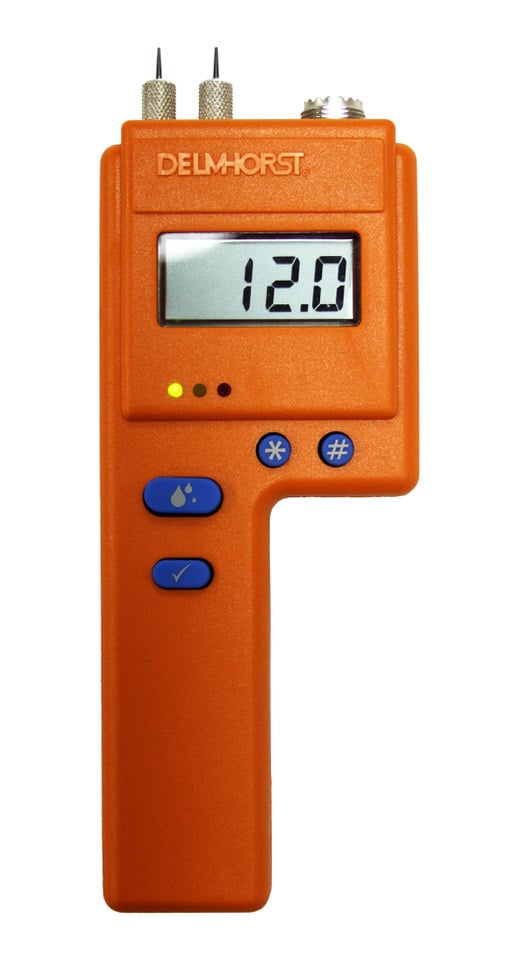Leading 10 Advantages of Using a Moisture Meter for Definite Measurements in your house
Wiki Article
The Ultimate Guide to Dampness Meters: A Comprehensive Review and Exactly How They Can Conserve You Cash
Dampness meters serve as indispensable devices in spotting and keeping an eye on moisture material in materials, aiding in avoiding pricey damages and guaranteeing the top quality of items. Understanding the nuances of various kinds of moisture meters, their applications, and the prospective cost-saving advantages they supply can be a game-changer for professionals and companies alike.Sorts Of Wetness Meters
Various sorts of wetness meters are readily available for different applications in numerous industries. One usual kind is the pin-type moisture meter, which measures the electric resistance between 2 pins put into a product. This type appropriates for wood, drywall, and other structure products. Pinless wetness meters, on the other hand, usage electro-magnetic sensing unit plates to scan a bigger area without triggering damage to the product's surface. Moisture Meter. These meters are perfect for rapidly analyzing dampness degrees in huge locations such as floorings and wall surfaces.
Infrared moisture meters determine the thermal homes of a product to identify its moisture content non-invasively, making them valuable for applications where pin or pinless meters might not be appropriate. Comprehending the various types of dampness meters readily available can help markets pick the most proper tool for their certain dampness dimension needs.

Benefits of Using Dampness Meters
Dampness meters offer vital advantages in precisely analyzing and keeping track of wetness degrees in diverse materials and atmospheres (Moisture Meter). Among the primary benefits of utilizing dampness meters is the avoidance of potential damage triggered by excess dampness. By spotting and attending to high moisture levels early on, wetness meters aid to stop mold and mildew growth, rot, and structural damages in buildings, conserving both time and money on repairs. Furthermore, dampness meters aid in ensuring the high quality of products during construction or manufacturing processes. By accurately measuring moisture content, these tools help maintain the integrity of timber, drywall, concrete, and various other products, reducing the risk of failings or issues.
Moreover, utilizing wetness meters can result in increased energy efficiency. By determining areas with high wetness levels, such as leakages or inadequate insulation, modifications can be made to improve power preservation and decrease utility costs. In farming settings, dampness meters play a critical function in maximizing crop yields by allowing farmers to monitor dirt moisture degrees and make informed watering decisions. On the whole, the benefits of making use of wetness meters span throughout various markets, supplying affordable solutions and advertising better quality assurance techniques.
Exactly How to Select the Right Dampness Meter
When selecting a moisture meter, it's vital to guarantee that the meter is ideal for the specific material you will be testing. Different products have varying electrical homes that can affect dampness analyses, so selecting a meter made for your product is important for accurate outcomes. By very carefully examining these elements, you can pick a wetness meter that meets your demands and supplies accurate dampness measurements for your tasks.Appropriate Methods for Moisture Meter Use

Cost Savings With Wetness Meter Applications
Just how can the critical usage of wetness meters bring about significant cost savings throughout numerous industries? Moisture meters play a vital duty in expense savings by avoiding potential damages and making certain quality assurance in various markets. In the agriculture sector, wetness meters aid in determining the optimum time for gathering crops, protecting against excess or over-drying wetness that can impact the end product's quality. This specific tracking helps farmers avoid unneeded losses and maximize their useful reference return.
Similarly, in construction, moisture meters assist stop expensive damages by finding moisture levels in building materials, such as timber or concrete, which can lead to structural concerns if not attended to quickly. By recognizing issue areas early, contractors can take restorative steps to stay clear of substantial repairs or substitutes, eventually click to read conserving money and time.
Furthermore, in the food handling sector, moisture meters are essential for monitoring item quality and ensuring conformity with safety and security regulations. By precisely determining dampness web content in foodstuff, manufacturers can stop perishing, keep quality, and reduce waste, resulting in significant expense savings. Generally, the critical application of dampness meters is a valuable investment that can result in considerable cost reductions and enhanced performance throughout various industries.
Conclusion
In conclusion, dampness meters are useful tools for detecting and gauging moisture degrees in various products. By using the right moisture meter and adhering to proper strategies, individuals can effectively stop costly problems caused by excess wetness.Dampness meters serve as indispensable devices in spotting and keeping track of moisture web content in materials, helping in preventing expensive problems and ensuring the high quality of products. Infrared wetness meters gauge the thermal homes of a product to determine its moisture web content non-invasively, making them beneficial for applications where pin or pinless meters might not be appropriate.Wetness meters use vital advantages in accurately keeping an eye on and examining moisture levels in varied products and settings. In agricultural settings, wetness meters play a vital duty in optimizing crop yields by allowing farmers to keep an eye on dirt dampness degrees and make educated watering choices.In verdict, moisture meters are valuable tools for gauging and identifying dampness levels in numerous products.
Report this wiki page